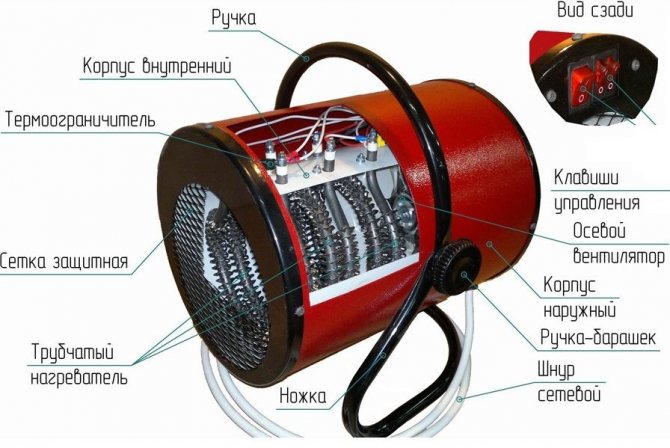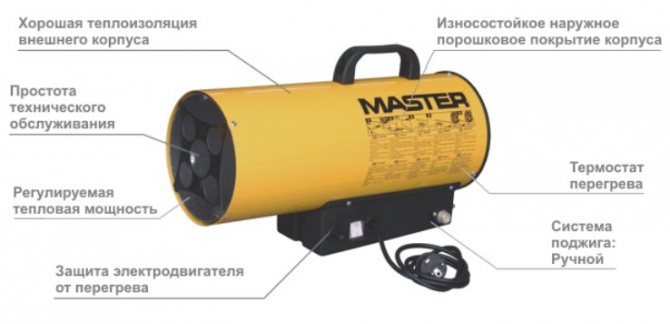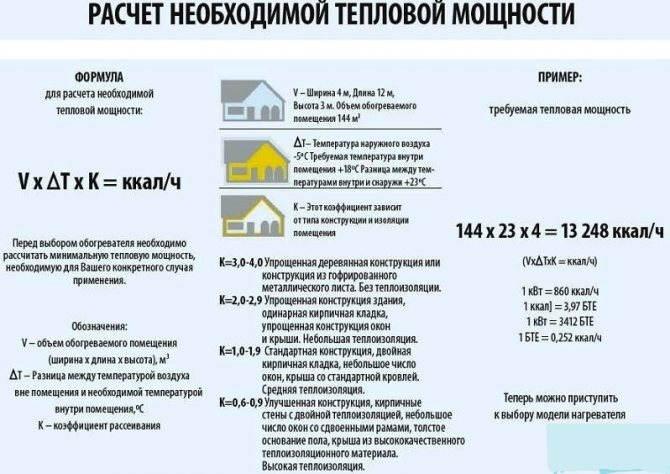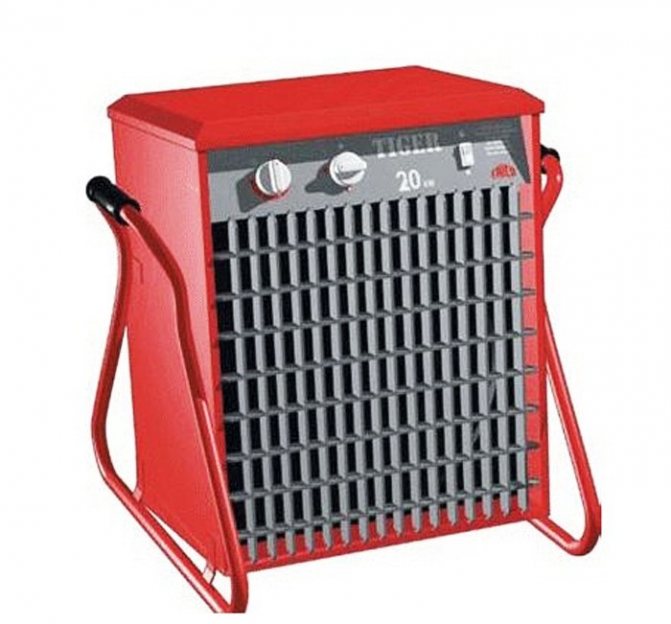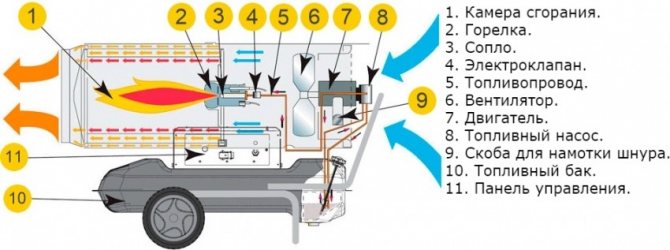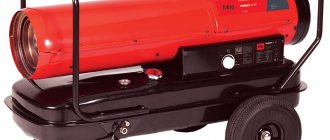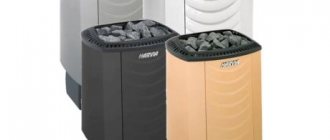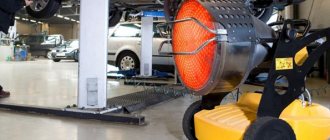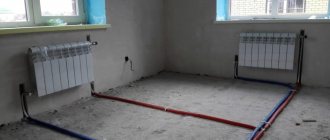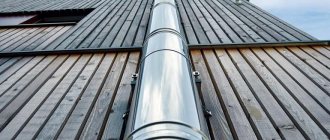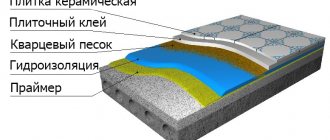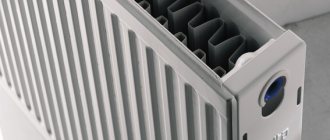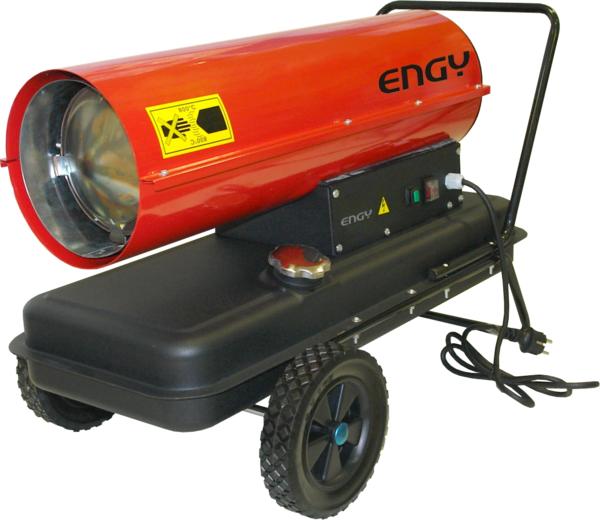
A popular and convenient air heater is the heat gun
Heat guns have a fairly wide range of applications: they are used to heat garages, warehouses, construction sites; installation of PVC ceilings, concrete screeds, etc. The devices gained such popularity due to their ability to quickly and economically heat a room. In addition, it is often easy to move the device: the weight of the gun, on average, is from 2 to 16 kg. What are heat guns and how to choose a highly efficient installation for various needs - read below.
Which heat gun is better: gas or diesel
Today, manufacturers produce thermal devices that can operate on diesel fuel, gas, and electricity. The most economical are diesel and gas heaters. Due to the widespread use of fuel, the gasoline heat gun is especially popular. The choice of a heating unit depends on the size of the room for which the device is selected and the quality of the ventilation system in the building.
So, diesel cannons are most often chosen for heating large industrial premises: they work quite noisily, and at the time of launch they emit an unpleasant odor.
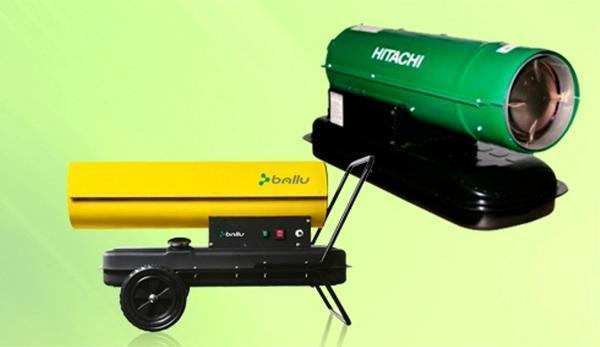

If you want to use a diesel device for mounting vinyl ceilings or drying concrete screed, then the repair room should be well ventilated and the gun should have a special chimney. However, diesel heaters are powerful and durable. And in case of breakdowns, it is much easier to repair diesel equipment than gas equipment.
The diesel cannon can also run on waste oil, which makes it even more economical to use.
Gas fired heat guns are handy devices that can be easily moved. They work quieter than diesel ones and are equipped with a gas cylinder, which solves the problem with refueling the device. In addition, the main advantage of gas cannons, in comparison with diesel ones, is that they do not generate an unpleasant odor during operation. However, the gas cannon “burns out” oxygen, so it is not recommended to use it in closed, small spaces.
When choosing a heater for a garage, you need to take into account the area of the room and the climate. How to make the right choice? Our tips on the next page:
https://youtu.be/OPziq7iQglo
Pros and cons of heat guns
The obvious advantages of gas heat guns are:
- low cost;
- simplicity of design (most of the breakdowns can be quickly eliminated by yourself);
- saving (heating is much cheaper than that of cannons fueled by diesel fuel, "working off" or electricity, some models are completely connected to the household gas distribution network);
- high power with small dimensions and weight (the average weight of the gun with the entire body kit is from 5 to 15 kilograms, depending on the power);
- there are models with support for connecting electricity through rechargeable batteries (performance does not depend on the availability of the mains);
- much saferthan diesel ones.
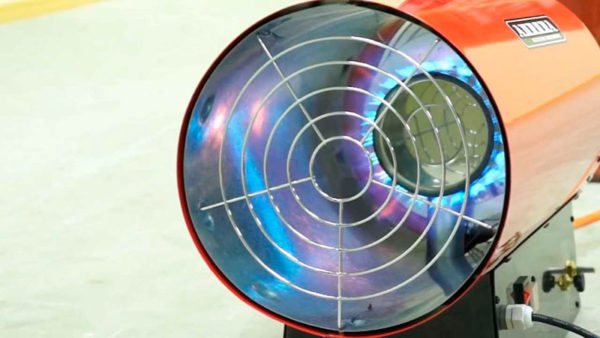

But they also have disadvantages. The essential ones are:
- as fuel - gas, if the rules for operating the device are violated, this will lead to fire;
- is necessary high-quality supply ventilation a heated room (otherwise, you can get poisoned by carbon monoxide);
- require regular maintenance (in particular, cleaning the gas supply system, changing filters, and so on);
- uneven heating premises (warm air accumulates at the top, cold air sinks to the floor, the temperature difference can reach 20 degrees).
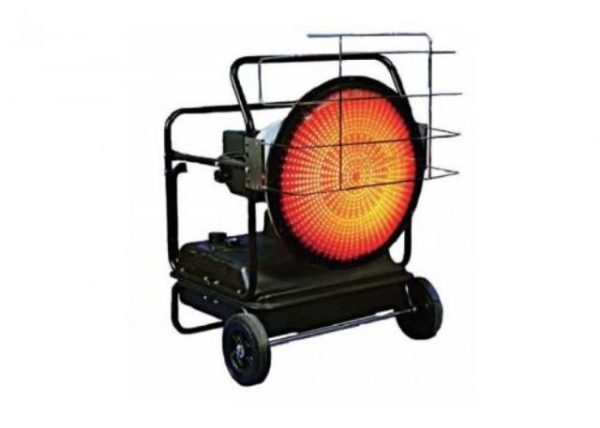

Diesel heat guns: principle of operation and selection rules
Diesel heat guns are safe, mobile devices that consist of a fuel tank, pump or compressor, combustion chamber, burner and fan. Diesel models with power ratings from 2.5 to 100 kW can be found on the modern market. Separately, there are powerful industrial heat guns with a capacity of 140-160 kW.
According to the principle of operation, Diesel cannons are divided into:
- Direct heating devices;
- Units with indirect heating.
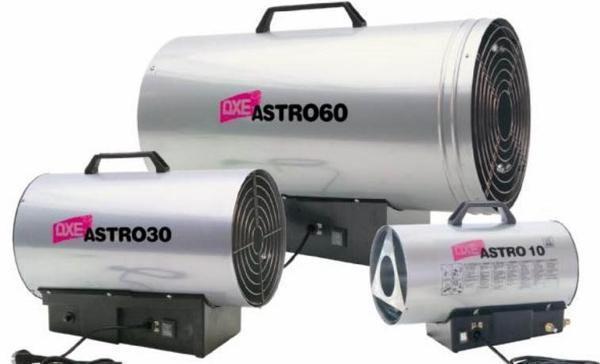

Diesel heating units with direct heating are characterized by high efficiency (about 90%). The disadvantage of such devices is that heated air is generated from the cannon together with combustion products. Therefore, they are not recommended for indoor use. But such devices are ideal for rapid heating of large production and storage facilities, for drying concrete screed at construction sites.
For residential installations, select indirect diesel heaters.
The principle of operation of such a heater is that the heated air is transported without harmful substances. The cost of such heaters is higher than that of devices with direct heating. But they can be installed in absolutely any room, regardless of size, type of ventilation, and permeability.
And for greenhouses, gas heaters will be the best heating method. They will help you get a rich harvest at no extra cost. Read about this in the article:
Varieties
A heat gun is a fairly effective heating device that perfectly heats a room with the help of an air heat flow.
The uniqueness of this type of equipment lies in the fact that its efficiency is almost 100%.
Heat guns are usually divided into types depending on what energy resource is converted into a stream of warm air.
Today there are the following types of heat guns:
- electrical (units of this type operate on a conventional household power supply);
- diesel (the principle of operation of such devices is that diesel oil or kerosene burns in a special chamber, while releasing heat, which is pumped into the room with a fan);
- gas (the principle of operation of this type of unit is similar to the previous one, but liquefied gas is used as fuel).
Consider the advantages and disadvantages of using different types of heating units for heating a garage.
Electrical
The main advantages of heating a garage with the help include the following points:
- small overall dimensions allow the unit to be installed anywhere in the garage;
- automatic control of the device;
- noiselessness of work;
- high level of fire safety.
However, there are also some "pitfalls" in the use of this type of heat gun:
- first of all, it is worth considering that the price of electricity is not very cheap now;
- you need to carefully consider the electrical wiring of the garage, since units of this type are quite powerful, and some garage power lines simply cannot withstand this;
- electrical appliances of this type must have additional functions, which include overheating protection and automatic temperature maintenance.
Gas
for garage premises have the following positive aspects:
- they use gas quite economically;
- quickly heat up the garage;
- equipped with an automatic overheating control and a carbon dioxide concentration sensor.
But do not forget about some of the nuances of gas heat guns for garage premises:
- for the operation of a unit of this type, a propane or butane cylinder is needed, which is sometimes difficult to obtain;
- in the garage, supply ventilation must work, since in these devices, together with the warm air flow, the products of gas combustion also come out.
An important point:
if the garage room is not equipped with a ventilation system, then the efficiency of using gas heat-guns will be reduced to zero, since the frequent opening of the gate for ventilation will contribute to the escape of heat.
Diesel
Units of this type can have two heating options:
- straight;
- indirect.
In direct-fired heat exchangers, the combustion products exit together with the air heat flow into the heated room.
The design of diesel units with indirect heating allows exhaust gases to be discharged outside the heated garage. This process is carried out using a special chimney, which can be presented in the form of a corrugated hose.
Therefore, it is very important to know that for heating the garage it is necessary to choose with indirect heating.
The advantages of units of this type include the following points:
- economical fuel consumption;
- the heat gun can operate for up to 10-14 hours at one filling of the fuel tank;
- heats the garage space efficiently enough.
Gas cannon in the garage: features of choice
A household heat gun in a garage is a gift for many motorists, because, often, there is no opportunity to organize heating in buildings of this type. And working in the garage in the winter can be extremely uncomfortable. Gas cannons are especially popular with garage owners: they are affordable, quiet and do not emit carcinogenic substances.
When choosing a gas cannon for a garage, you should determine the optimal power of the device based on 1 kW of thermal power per 10 square meters of room area with ceilings no higher than 3 m.
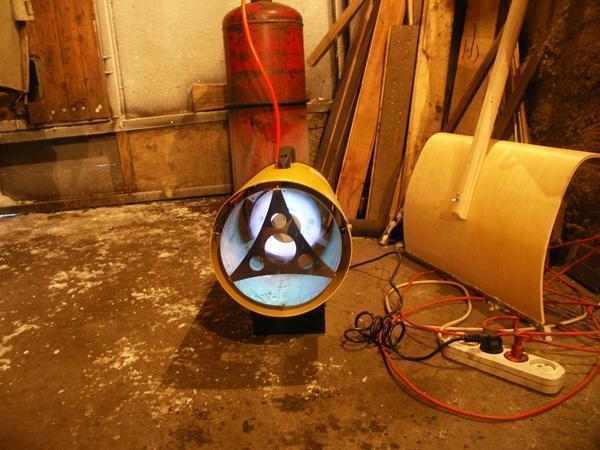

So, the best option for an average garage of 25 square meters would be a heating installation with a capacity of 3-5 kW. An insufficiently powerful cannon will not cope with its task, and an overabundance of power will affect the amount of fuel and electricity required to operate the device.
At the same time, experts recommend insulating the garage or, at least, eliminating cracks and holes through which warm air can be removed.
Firstly, it will be easier to calculate the required power of the gun. Secondly, you do not have to overpay for heating the "street". Insulating the building will also be useful if you decide to store the heater directly in the garage: the optimal temperature for storing equipment is +5 degrees.
Choosing a heat gun for a garage
Since I have to spend most of my time in the garage, dismantling cars for parts, with the onset of cold weather I thought about insulating my workplace. First, he insulated the garage doors with floor cladding from old cars so that there were no cracks or drafts. But this, of course, was not enough, since it will be simply impossible to work in severe frosts.
That is why it was decided to buy a heat gun that could quickly heat an area of about 30 squares. At first I looked closely at the options with a capacity of 3 kW, which at first glance seemed very powerful. And without choosing for a long time, I bought myself one model, which was supposed to heat my garage quickly enough, judging by the declared characteristics. By the way, she is in the photo below:
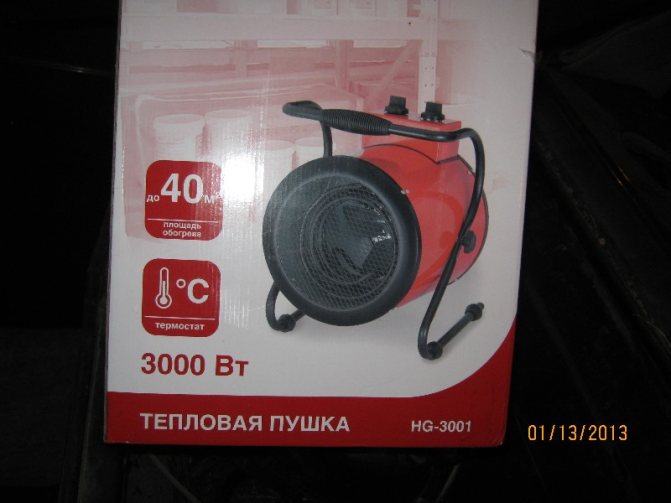

As you can see, judging by the fact that the name of the company is not indicated on the packaging, the device is clearly Chinese and of questionable quality, but still I hoped that having given 2000 rubles for it, it would work more or less normally. But the miracle did not happen, and after working at full capacity for 3 hours, the temperature in the garage did not rise even 1 degree higher.This is despite the fact that there were only frosts outside (no more than -3 degrees).
In the end, when I realized that this was a frank slag, I decided to quickly take her back to the store and look for more decent options.
The senior salesman took the gun and without saying a word, she took me to a display case with similar goods, where she offered me the option that would be the perfect solution for me. At first I did not understand what she wanted to sell me, since this pshikalka clearly did not look like a serious heat gun. Here is her screen:
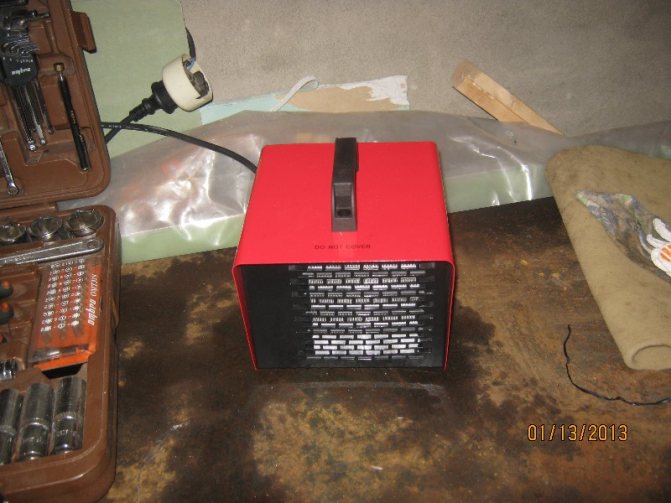

But when she turned it on in front of me, I realized that this is the thing that I need. According to its characteristics, it was clearly inferior to the previous product. Its power is 2 kW, the productivity is half as much, BUT - this is only according to the documents. In fact, this stove heats up like a fire, especially when the second speed is turned on.
The warmth is felt even at a distance of 2 meters from it, although the air is slightly directed upward, which in some cases is even quite comfortable. As a result, after testing this thing already in my garage, the temperature rose by 5 degrees in an hour: from 10 to 15 degrees. This arrangement completely suited me, and even more so since the price of this device is only 1,500 rubles. In general, even with frosts down to -15 degrees, an area of about 28-30 squares can be heated.
I am completely satisfied with the purchase and so far there is enough heat for my garage area, although I have to pay 350-400 rubles for electricity every month, but as they say, health is more expensive!
How to choose a heat gun: recommendations
When choosing a heater, one should take into account not only the power of the gun and the size of the room, but also the quality of ventilation in the room. There are many nuances on which the comfort and safety of using a thermal device, its durability and efficiency depend.
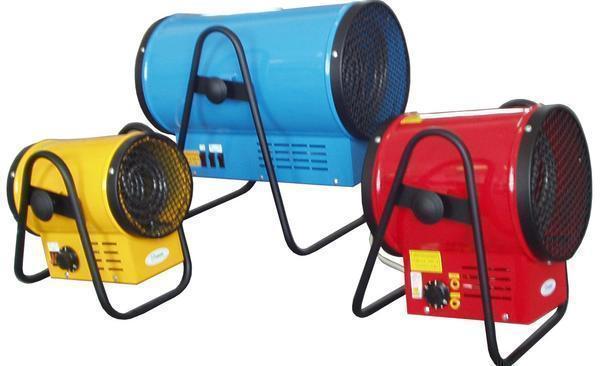

So, when choosing a heating installation, it is necessary:
- Decide for what purpose you need the device. You can buy a gas or electric cannon to heat living rooms. But, it should be borne in mind that for the second one you need a permanent connection to the electricity network with a voltage of 220-380 V.
- Make sure that there are autonomous safety systems in the structure. So, the heating gun, at a minimum, must have sensors that will autonomously interrupt the operation of the device in the event of a fire hazard (for example, overheating).
- Pay attention to the presence of additional functions, components. So, an electric heat gun should be equipped with a special protective mesh; household appliances - have a thermostat that allows you to set the desired temperature, and portable devices come complete with wheels.
- Pay attention to the noise level that the device emits during operation. The optimum noise level is considered to be within 40 dB.
If you choose a heat gun in a store, it will not be superfluous to ask the staff to take a test drive of the model in order to check its performance.
But the cannon for stretch ceilings is allowed to be used only by professionals. What are the types of device features, you can find out on the next page:
Conditions for choosing a heat gun
When the garage is insulated, you can start heating it. The heat gun is able to warm up the air in the room in a short time and maintain its temperature in the selected range.
The choice of the gun is carried out based on the volume of the room, the temperature in the winter season, the insulation coefficient, which depends on the thermal conductivity of the garage construction materials and the thickness of the layers of each of them. In addition, the frequency and intensity of the use of the gun and the presence of communications in the room are taken into account.
The larger the garage, the colder the winters and the "thinner" the walls, the more power is needed for the heating device. The more often and for a longer time the garage needs heating, the more reliable and efficient the unit is needed.
The presence of electrical wiring does not at all guarantee the possibility of heating with an electric heat gun.
Which heat gun to choose: rating of the best devices
When choosing heat guns, buyer's experience should be taken into account. Based on user feedback, an overview of the highest quality and most efficient heating devices can be made.
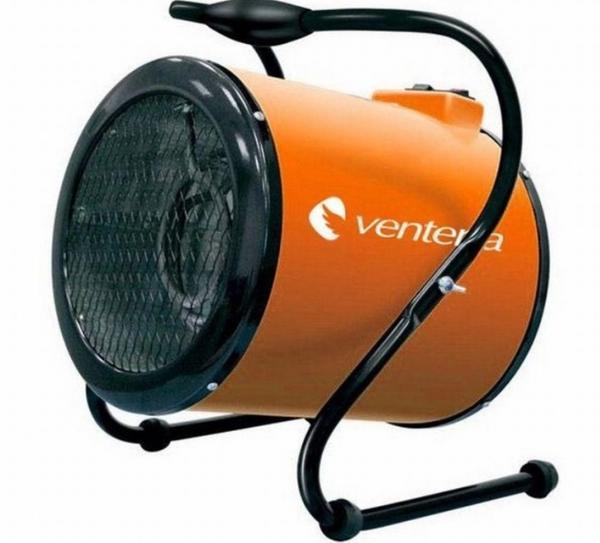

So, have proven themselves well:
- Electric heater Interskol TPE-3;
- BLP 17M gas cannon from the American company Master;
- Oil heater BV 77E from Master.
Models from manufacturers Sial and Kroll are distinguished by high quality products. Both companies make mobile heat guns with built-in thermostats, a reliable overheating protection system and a lot of additional options.
What is a diesel heat gun (video)
Heat guns are mobile, affordable and economical devices that allow you to quickly warm up the room, speed up the installation of floors and ceilings. Today, the most popular heat guns are electric heaters, devices that run on gas, diesel fuel. Which gun is better to choose depends on the size and purpose of the room, the quality of ventilation in the room, and the availability of a connection to the central power grid. And the above tips and ratings can help with the choice.
- Author: admin
Rate the article:
- 5
- 4
- 3
- 2
- 1
(0 votes, average: 0 out of 5)
Share with your friends!
